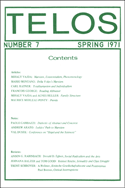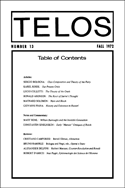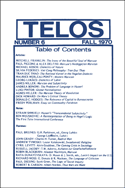By James Santucci · Tuesday, April 9, 2013 As an occasional feature on TELOSscope, we highlight a past Telos article whose critical insights continue to illuminate our thinking and challenge our assumptions. Today, James Santucci looks at François George’s “Reading Althusser,” from Telos 7 (Spring 1971).
François George believes that Louis Althusser does not deserve his reputation, and he wants to prove it to you. He writes:
 Since the mainstay of [Althusser’s] thought is its “rigor,” we will demonstrate that it is the least rigorous of all, taking as the principal example his recent work, Lenine et la Philosophic. The occasion for the following discussion is a conference in an extremely academic context: the French Society of Philosophy. Naturally, Althusser feels uneasy in this situation. Marxists, for whom thought should be practical, must seek to transform society rather than to exert themselves in these closed contexts. Was he forced to attend? Althusser accepts his role only by dismissing it. . . . Why has he come, if he rejects this degraded form of philosophy and human relations? He is interested only in the justification of this rejection or, in his own words, this denial: “the only possible communications and discussions are scientific ones.” Under the pretext of attacking the meaninglessness of the philosophical gatherings in which he participates, Althusser rejects all non-scientific human communications as a scientist addressing a “scientific society.” Evidently, then, Althusser attends the French Society of Philosophy conference because he lacks the qualifications required by the international congress on astrophysics. All would go well, said Proudhon, when the government’s power was replaced by that of the Academy of Sciences—which should not be confused with the workers’ councils. (73–74) Since the mainstay of [Althusser’s] thought is its “rigor,” we will demonstrate that it is the least rigorous of all, taking as the principal example his recent work, Lenine et la Philosophic. The occasion for the following discussion is a conference in an extremely academic context: the French Society of Philosophy. Naturally, Althusser feels uneasy in this situation. Marxists, for whom thought should be practical, must seek to transform society rather than to exert themselves in these closed contexts. Was he forced to attend? Althusser accepts his role only by dismissing it. . . . Why has he come, if he rejects this degraded form of philosophy and human relations? He is interested only in the justification of this rejection or, in his own words, this denial: “the only possible communications and discussions are scientific ones.” Under the pretext of attacking the meaninglessness of the philosophical gatherings in which he participates, Althusser rejects all non-scientific human communications as a scientist addressing a “scientific society.” Evidently, then, Althusser attends the French Society of Philosophy conference because he lacks the qualifications required by the international congress on astrophysics. All would go well, said Proudhon, when the government’s power was replaced by that of the Academy of Sciences—which should not be confused with the workers’ councils. (73–74)
Continue reading →
By James Santucci · Tuesday, December 18, 2012 As an occasional feature on TELOSscope, we highlight a past Telos article whose critical insights continue to illuminate our thinking and challenge our assumptions. Today, James Santucci looks at Karel Kosík’s “Our Present Crisis” from Telos 13 (Fall 1972).
 Karel Kosík’s story begins with the end of a statue. In 1962, a granite statue of Stalin that had been begun in 1955 was completed only to be torn down several months later. For Kosík, the statue, “designed to last forever,” perfectly represented the provisionalism and nihilism of modern times. It laid bare the inescapable tension between living peacefully in social life and the animal brutality that occasionally became necessary. When the statue was torn down, the base was left behind. In Kosík’s time, there were plans to transform the space into a garden restaurant. The restaurant’s relationship to its past would be complicated, but plans were scrapped, which saved any Prague tourists from the awkwardness of “Would you like to see our drink menu while you contemplate what it means to live under threat of random and instantaneous erasure?” Karel Kosík’s story begins with the end of a statue. In 1962, a granite statue of Stalin that had been begun in 1955 was completed only to be torn down several months later. For Kosík, the statue, “designed to last forever,” perfectly represented the provisionalism and nihilism of modern times. It laid bare the inescapable tension between living peacefully in social life and the animal brutality that occasionally became necessary. When the statue was torn down, the base was left behind. In Kosík’s time, there were plans to transform the space into a garden restaurant. The restaurant’s relationship to its past would be complicated, but plans were scrapped, which saved any Prague tourists from the awkwardness of “Would you like to see our drink menu while you contemplate what it means to live under threat of random and instantaneous erasure?”
Continue reading →
By James Santucci · Tuesday, September 4, 2012 As an occasional feature on TELOSscope, we highlight a past Telos article whose critical insights continue to illuminate our thinking and challenge our assumptions. Today, James Santucci looks at Fredy Perlman’s “Essay on Commodity Fetishism” from Telos 6 (Fall 1970).
 Two interesting things happened in the brouhaha over the proper antecedent of “that” in “You didn’t build that.” First, Dylan Matthews, a senior at Harvard who writes for Ezra Klein’s Wonkblog, explained several different theories of dessert and how each interpretation would inform the intent behind President Obama’s phrase. Soon afterward, Rush Limbaugh attempted to discredit Matthews’s and the Obama campaign’s defenses of the statement by accusing them of working with words. Never mind that they were accused of working with words; what we’re interested in is the suggestion that there is a fundamental antithesis between working with words and materially engaging with the world. Without meaning to do so, the two provided a perfect context for reading Fredy Perlman’s “Essay on Commodity Fetishism.” A close reading of the essay reveals that not only is there no antithesis, but also that because of the theory of the commodity fetish, Marxism is material engagement with real phenomena. Two interesting things happened in the brouhaha over the proper antecedent of “that” in “You didn’t build that.” First, Dylan Matthews, a senior at Harvard who writes for Ezra Klein’s Wonkblog, explained several different theories of dessert and how each interpretation would inform the intent behind President Obama’s phrase. Soon afterward, Rush Limbaugh attempted to discredit Matthews’s and the Obama campaign’s defenses of the statement by accusing them of working with words. Never mind that they were accused of working with words; what we’re interested in is the suggestion that there is a fundamental antithesis between working with words and materially engaging with the world. Without meaning to do so, the two provided a perfect context for reading Fredy Perlman’s “Essay on Commodity Fetishism.” A close reading of the essay reveals that not only is there no antithesis, but also that because of the theory of the commodity fetish, Marxism is material engagement with real phenomena.
Continue reading →
By James Santucci · Thursday, August 9, 2012 As an occasional feature on TELOSscope, we highlight a past Telos article whose critical insights continue to illuminate our thinking and challenge our assumptions. Today, James Santucci looks at Paul Piccone’s “Towards a Socio-Historical Interpretation of the Scientific Revolution” in Telos 1 (Spring 1968). This essay was also republished as part of the anthology Confronting the Crisis: Writings of Paul Piccone, available from Telos Press.
Paul Piccone begins this essay with a word of caution for anyone looking back at the scientific revolution:
The scientific revolution of the 16th century is popularly thought of as having freed mankind from superstition and myth. This account, however, runs into difficulties when it is realized that superstition and myth are still with us and, furthermore, that institutionalized irrationality is a predominant feature of 20th century society.
 The popularly held view that Piccone mentions doesn’t just arrive at different conclusions about what happened in history; it requires a completely different view of how history happens. History, in this view, has been continuously building toward modernity, and the triumph of rationalism and science in the sixteenth century were culture’s first steps toward the superior ways of being and thinking that we have today. The signal that our ways of being and thinking today are superior, of course, is that we have them today, and what could possibly be more modern? The popularly held view that Piccone mentions doesn’t just arrive at different conclusions about what happened in history; it requires a completely different view of how history happens. History, in this view, has been continuously building toward modernity, and the triumph of rationalism and science in the sixteenth century were culture’s first steps toward the superior ways of being and thinking that we have today. The signal that our ways of being and thinking today are superior, of course, is that we have them today, and what could possibly be more modern?
Continue reading →
|
|
Since the mainstay of [Althusser’s] thought is its “rigor,” we will demonstrate that it is the least rigorous of all, taking as the principal example his recent work, Lenine et la Philosophic. The occasion for the following discussion is a conference in an extremely academic context: the French Society of Philosophy. Naturally, Althusser feels uneasy in this situation. Marxists, for whom thought should be practical, must seek to transform society rather than to exert themselves in these closed contexts. Was he forced to attend? Althusser accepts his role only by dismissing it. . . . Why has he come, if he rejects this degraded form of philosophy and human relations? He is interested only in the justification of this rejection or, in his own words, this denial: “the only possible communications and discussions are scientific ones.” Under the pretext of attacking the meaninglessness of the philosophical gatherings in which he participates, Althusser rejects all non-scientific human communications as a scientist addressing a “scientific society.” Evidently, then, Althusser attends the French Society of Philosophy conference because he lacks the qualifications required by the international congress on astrophysics. All would go well, said Proudhon, when the government’s power was replaced by that of the Academy of Sciences—which should not be confused with the workers’ councils. (73–74)
 Karel Kosík’s story begins with the end of a statue. In 1962, a granite statue of Stalin that had been begun in 1955 was completed only to be torn down several months later. For Kosík, the statue, “designed to last forever,” perfectly represented the provisionalism and nihilism of modern times. It laid bare the inescapable tension between living peacefully in social life and the animal brutality that occasionally became necessary. When the statue was torn down, the base was left behind. In Kosík’s time, there were plans to transform the space into a garden restaurant. The restaurant’s relationship to its past would be complicated, but plans were scrapped, which saved any Prague tourists from the awkwardness of “Would you like to see our drink menu while you contemplate what it means to live under threat of random and instantaneous erasure?”
Karel Kosík’s story begins with the end of a statue. In 1962, a granite statue of Stalin that had been begun in 1955 was completed only to be torn down several months later. For Kosík, the statue, “designed to last forever,” perfectly represented the provisionalism and nihilism of modern times. It laid bare the inescapable tension between living peacefully in social life and the animal brutality that occasionally became necessary. When the statue was torn down, the base was left behind. In Kosík’s time, there were plans to transform the space into a garden restaurant. The restaurant’s relationship to its past would be complicated, but plans were scrapped, which saved any Prague tourists from the awkwardness of “Would you like to see our drink menu while you contemplate what it means to live under threat of random and instantaneous erasure?”  Two interesting things happened in the brouhaha over the proper antecedent of “that” in “You didn’t build that.” First, Dylan Matthews, a senior at Harvard who writes for Ezra Klein’s Wonkblog, explained several different theories of dessert and how each interpretation would inform the intent behind President Obama’s phrase. Soon afterward, Rush Limbaugh attempted to discredit Matthews’s and the Obama campaign’s defenses of the statement by accusing them of working with words. Never mind that they were accused of working with words; what we’re interested in is the suggestion that there is a fundamental antithesis between working with words and materially engaging with the world. Without meaning to do so, the two provided a perfect context for reading Fredy Perlman’s “Essay on Commodity Fetishism.” A close reading of the essay reveals that not only is there no antithesis, but also that because of the theory of the commodity fetish, Marxism is material engagement with real phenomena.
Two interesting things happened in the brouhaha over the proper antecedent of “that” in “You didn’t build that.” First, Dylan Matthews, a senior at Harvard who writes for Ezra Klein’s Wonkblog, explained several different theories of dessert and how each interpretation would inform the intent behind President Obama’s phrase. Soon afterward, Rush Limbaugh attempted to discredit Matthews’s and the Obama campaign’s defenses of the statement by accusing them of working with words. Never mind that they were accused of working with words; what we’re interested in is the suggestion that there is a fundamental antithesis between working with words and materially engaging with the world. Without meaning to do so, the two provided a perfect context for reading Fredy Perlman’s “Essay on Commodity Fetishism.” A close reading of the essay reveals that not only is there no antithesis, but also that because of the theory of the commodity fetish, Marxism is material engagement with real phenomena.  The popularly held view that Piccone mentions doesn’t just arrive at different conclusions about what happened in history; it requires a completely different view of how history happens. History, in this view, has been continuously building toward modernity, and the triumph of rationalism and science in the sixteenth century were culture’s first steps toward the superior ways of being and thinking that we have today. The signal that our ways of being and thinking today are superior, of course, is that we have them today, and what could possibly be more modern?
The popularly held view that Piccone mentions doesn’t just arrive at different conclusions about what happened in history; it requires a completely different view of how history happens. History, in this view, has been continuously building toward modernity, and the triumph of rationalism and science in the sixteenth century were culture’s first steps toward the superior ways of being and thinking that we have today. The signal that our ways of being and thinking today are superior, of course, is that we have them today, and what could possibly be more modern? 

